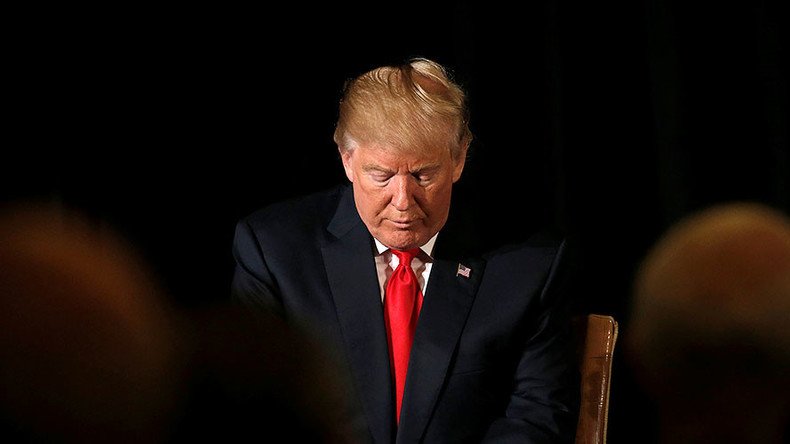Tweeter-in-Chief: 'Trump tweets foreign policy positions, avoids intelligence briefings'

Because Donald Trump doesn’t have foreign policy experience; he seems to make decisions on impulse; he tweets a lot of his foreign policy positions instead of being briefed, Bill Richardson, former Governor of New Mexico, told RT America’s Ed Schultz.
US President-elect Donald Trump repeatedly said on the campaign trail that he would “drain the swamp” in Washington, although he seems to be doing a good job of keeping some of the alligators.
Trump stayed inside the beltway to appoint two key positions in his cabinet, Congressman Tom Price, who has been the most vocal critic of Obamacare, has been named the head of Health and Human Services. Elaine Chao, the wife of Senate Majority Leader Mitch McConnell, has been appointed Transportation Secretary. Meanwhile, Mitt Romney is expected to become the next Secretary of State, as Trump has a second meeting with the former US presidential candidate.
RT: Give us some insight, how would it be to work for someone with a flippant personality or someone who changes course or direction, when you’re in the business of diplomacy?
Bill Richardson: Foreign policy, national security is the most important responsibility of a president. So it could be a problem for cabinet members that he appoints in the national security field to deal with Donald Trump because he doesn’t have foreign policy experience; he seems to make decisions on impulse; he tweets a lot of his foreign policy positions instead of being briefed. He is not getting his intelligence briefings, which every President should use to find out the state of the world at the time.
But at the same time, I think it is very important that a president feels a comfortable personal chemistry with whomever he appoints. So far in the national security field, I think Nikki Haley, the UN Ambassador is probably a good appointment – it is diversity, a woman.
I am concerned about national security experience, a lack of it. General [Michael] Flynn, some of his views on the Arab states, on terrorism, on Muslims are of concern. But I think the big one is the Secretary of Defense, CIA Director, and Secretary of State – those are the big ones, and these have to be very solid appointments.
RT: What about Russia? Cooler relations between Putin and Obama right now. Do you think Russia and the US can have a better world between the two of them? How key is the Middle East to this relationship?
Last ditch effort? Kerry ‘wants to seal deal’ with Russia before Trump becomes US president - Kremlin https://t.co/KFxyfGf1X3
— RT (@RT_com) 28 ноября 2016 г.
BR: Well, the Middle East is key and my concern is President-elect Trump basically letting Russia run our Syria policy. In other words, are we going to be to be too close to President Bashar Assad of Syria? I think that is a bad decision. But we want to see an improvement in the relationship between the US and Russia. There are a lot of issues, like arms control, that are key; like the Iran agreement; like energy – Russia is a main player in oil supply; issues relating to the entire third world; issues relating to the international economy; to Ukraine; the enlargement of NATO. This is a very important relationship that has frayed. If Trump, because of some kind of relationship with Putin can improve it – that is good. But my big worry is Syria, that we’re going to fall into a trap of backing Assad, of not recognizing the humanitarian tragedy there, of doing something about bringing, for instance, the Israelis and Palestinians together in this two-state solution, and somehow because of our relationship with Syria and Russia – that the whole Middle East could unravel…
RT: Do you believe that sanctions work? There are a lot of sanctions placed on countries around the world: with Russia, North Korea, etc. Is it a productive path?
BR: Well, sanctions are a tool. In other words they are a form of diplomacy that does not resort to military action. You first have strong diplomacy. If that doesn’t work you do sanctions. Then you do - hopefully not - military action.
But sometimes sanctions work. I think sanctions worked in South Africa with apartheid. Sanctions worked with Iran, it brought them toward an agreement. Have they worked with North Korea? I am not sure because they keep developing their nuclear arsenal. It depends on how you use them, whether you’re selective. With Russia, I would be for a relationship that if Russia and the US worked on all these issues that I mentioned: arms control, Syria, Ukraine – that lessening sanctions would be an order. Sanctions have hurt the Russian economy – the ruble has had some problems, and there are other energy issues – the price of oil has affected their budget. But I think sometimes they work, other times they are counter-productive - that is the short answer.
The statements, views and opinions expressed in this column are solely those of the author and do not necessarily represent those of RT.












